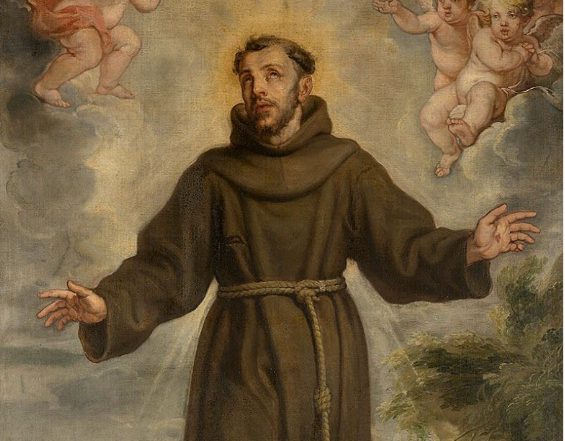Winner of the Spring 2019 StMU History Media Award for
Best Article in the Category of “People”
Francis was faced with a very large obstacle: while he was trying his hardest to pursue what he found to be his vocation, the hate that welled up in his father proved to be a major issue in his passage to that calling. Even though Francis knew without a doubt that he could easily become a very successful merchant, he felt an even stronger gravitation towards another life. Indeed, he felt called to a life that would constantly require to him to put the skills he gained from shadowing in his father’s work and provide him with an even stronger fulfillment in his life, despite it being very much against the social standards of his community and the wishes of his father. While his father saw his choice as an acceptance of failure, Francis saw it as an answer to the call of something greater than anyone could have ever imagined.
In Assisi, Italy, lived our character, Francis. Francis was born in 1182 to Pietro and Pica Bernardone. Throughout his childhood, Francis proved to be a very charming and popular young boy, as he was well liked by many children in his area, and was constantly followed by a group of friends. At home, Francis’ parents were very caring for him and constantly tended to all his wants and needs. His father was a very successful textile merchant, a career that made him and his family wealthy, while Francis’ mother stayed at home with him and did house work, including serving Francis, making him the center of her life, her pride and joy.1 Francis was well set with a large group of friends and two parents that loved to spoil him.2 When Francis was of age, he went to work with his father to learn the business of a merchant. Francis, as it turned out, was a natural, and caught on to the trade very well. After a short time, he began showing signs of a bright future as a textile merchant.
Merchants in Francis’ time were those that traveled long distances in order to exchange goods in various lands with various people. Textile merchants, the kind of merchant that Francis’ father was, tended to sell a great amount of goods and generally made very large amounts of revenue from their sales. Merchants were also well known for influencing the spread of culture and religion to those that they sold to, as they needed to be very persuasive in order to make sales, and were naturally found to do the same with their lifestyles. As a result, Francis quickly learned not only how to sell goods, but how to teach as well. The skill of spreading and teaching customs, language, and especially religion would greatly influence Francis’ future. His father had no idea that he was preparing his son for a future calling outside of textile trading.3
When Francis reached young adulthood, a war had sparked in his country, Assisi, and its neighboring city, Perugia. Francis was sent into the military to take part. On the battlefield, Francis observed firsthand the many horrors of battle, and was left with experiences that would haunt him for quite some time. Francis was not in a good mental state when he was sent home from his first tour, and sadly, he hardly had time to recover before he was sent to war a second time. The next time he came home, Francis’ behavior had taken a turn for the worst, as his memories had scarred him greatly. To attempt to rid himself of these scars, Francis tried to return to the life he had right before he first left home. In an attempt to adapt to civilian life, Francis ultimately found himself drinking heavily with his friends and was frequently surrounded by constant celebrations. In addition to his attempts to fuel his social life, he continued to live the life of good luxury in his home. All of his attempts, however, only numbed the pain for a very short time.4
Not long after returning to life in his town, Francis had fallen gravely ill. Eventually, when his state failed to improve, it seemed very likely that he would die from the illness that had caught hold of him. Francis was surrounded by distress and fear, and it seemed to him that there was nowhere to turn. With nowhere else to seek refuge, Francis began to turn towards his faith, which he had neglected through his life of luxury and celebration. He began to visit the local church daily to reflect and pray. He found a very strong devotion to Christ’s Passion, through the Stations of the Cross. This was a small conversion that would continue to influence Francis. After turning his face towards the church, Francis found himself healing from his great illness. In response, he began to devote more and more time to his spirituality within the church: he reflected daily on Christ’s Passion through the Stations of the Cross. His illness quickly forgotten, Christianity became the most important matter in Francis’ life. Unbeknownst to his community or himself, Francis was changing.5
His parents were the first to see the changes that Francis was going through, though they knew not what was going on in his life. All they noticed was that his mood, all of a sudden, had become withdrawn from others. After a while, they noticed that Francis was acting out of the ordinary, very unlike what they had always known him to be. Then, all together, without any warning, Francis simply left. Francis’ parents had no idea where he had gone or what he was up to.6
Francis had left his old life behind and began a new one. He took a vow of poverty. He no longer held a longing to have many material possessions or a large accumulation of wealth, things he was raised with. Instead, he began to focus all of his energy on teaching and preaching to others, using his skills that he had drawn from his merchant work with his father. He found that he loved to talk with his fellow brothers and sisters, and he wanted to bring them to a life dedicated to Christ. He even preached when there were no humans to preach to. Francis was known to preach to birds and other animals. He called them, too, his brothers and sisters, for he considered them to be part of God’s gifts in creation. This is the side of Francis that many Catholics would know him for as a saint, hundreds of years in the future.

Although Francis had found a path that he was truly happy to follow, his father did not share this same view. Francis’ father viewed his son’s decision as an embarrassment, since he had been raised in a place of high status. His father felt that Francis had thrown away everything that was handed to him, and tainted the family name. Soon, the frustrations of Francis’ father turned to hate and hostility, and Francis was no longer welcomed home. Despite all this, Francis continued on the path he vowed to follow.7
Despite the unfortunate circumstance with his father, Francis continued on his path of asceticism and growth of himself and others in Christ. The nature of his work ensured that Francis would travel to many areas, another lifestyle that he had grown accustomed to from his work as a merchant. Everywhere he went, he preached and began to accumulate followers. Pretty soon, Francis became a popular figurehead and was beloved by many, just as he had been as a boy. This time, however, it was by his work, not his wealth and social status, that he gained such immense popularity.
Francis saw that he had a large congregation of followers that loved his ways, so he decided to go to the Holy Father to establish a religious order after his teachings. He went with his most loyal followers and presented his request to Pope Innocent III. The order was denied at first, but after much convincing from Francis, Innocent III agreed and declared the order. Upon hearing this, Francis’ followers were overjoyed. Francis and his newly vowed religious brothers began to take on new assignments in order to guide others to Christ.8

Francis gave up everything in order to pursue his vocation in life. He abandoned the wealth and luxury that was readily available to him, and dedicated himself to a life that was so much more. Francis fought through the attitudes of his community and family alike, and stood by the life that he believed to be prosperous, going so far as to create an order that stands strong today. After his death, Francis was canonized on July 26, 1228, by Pope Gregory the IX. St. Francis is today one of the most beloved saints in the Catholic church and is often remembered for his many works and dedication to Christ and his people.9

- Paul Sabatier, The Road to Assisi (Massachusetts: Paraclete Press, 2003), 17-18. ↵
- Augustine Thompson, O.P., Francis of Assisi: A New Biography (New York: Cornell University Press, 2012), 8-9. ↵
- Paul Sabatier, The Road to Assisi (Massachusetts: Paraclete Press, 2003), 15-17. ↵
- Paul Sabatier, The Road to Assisi (Massachusetts: Paraclete Press, 2003), 19-20. ↵
- Augustine Thompson, O.P., Francis of Assisi: A New Biography (New York: Cornell University Press, 2012), 13. ↵
- Augustine Thompson, O.P., Francis of Assisi: A New Biography (New York: Cornell University Press, 2012), 14. ↵
- Paul Sabatier, The Road to Assisi (Massachusetts: Paraclete Press, 2003), 46-56. ↵
- Paul Sabatier, The Road to Assisi (Massachusetts: Paraclete Press, 2003), 64-67. ↵
- Paul Sabatier, The Road to Assisi (Massachusetts: Paraclete Press, 2003), 172. ↵



101 comments
Cassandra Sanchez
I had only briefly heard about how St Francis had gone through some rough and traumatic experiences in his life and thought it was really amazing how he was willing to give up everything he believed in to pursue a life that was discouraged by his family. Although he was good at being a merchant, it wasn’t until later experiences that he found what he was truly passionate about and loved to do.
Emmanuel Ewuzie
To build a legacy that lives on long after you are dead is priceless. The sacrifices Francis made were astronomical as he basically threw his whole life away. At the time, those decisions seemed asinine to say the least. To leave your family, wealth, status and security for a life of poverty seems delusional. However, Francis’ decision to do such has lead to the continuing of his legacy demonstrating in order to be great, you have to make great sacrifices and leaps of faith
Juan Arceo
With me being catholic, I have had some knowledge of St. Francis of Assisi and I truly admire his way of thinking. The fact that he had everything that anybody would ever want by being a merchant and living the luxury life, but having suffered some traumatic events in war, led him looking towards God for a cure for his disease. I truly enjoyed reading this article as it showed how he took the little things in life and truly appreciated everything that was presented towards him.
Rinnu Joy
When we look at the lives of any saints, we can see a lot of struggles they had gone through in order to get the consent of their family. As in the case of St. Francis Assisi, his father’s disagreement to his decision grew into a hatred that he was no longer welcomed to home.
St. Francis Assisi was a person who preached entirely different from other religious teachers. I have heard a story of him going to the town with one of his students who was so excited to see St. Francis’s teachings but he didn’t find any. He expected Assisi preaching in the town and people gathering around him. But the way Assisi taught Jesus was by getting into conversations with the people he met along his way to the town and giving them advice and solutions for the problems they are facing.
It is a great article. Congratulations!
Nicole Ortiz
I had never heard of the story of St. Francis until I read this article. I knew that he was one of the well known saints but i never found out why until now and his story is amazing. It’s hard to be able to leave everything behind, especially knowing that one has wealth and materialistic things to throwing it all away and living a life of poverty. But when one is truly a follower of Christ, the little materialistic things and ideas of wealth don’t matter because God is selfless and loves others, just as St. Francis loved and cared for others and truly wanted to be a servant of Christ. No wonder why he’s such a famous saint, he was such a humble human being and deserves to be recognized as a saint.
Charli Delmonico
This article was very well-written! I didn’t have any prior knowledge of who St. Francis really was; I had heard of him and knew the basics of his life, but I didn’t realize how traumatized he was after going to war. I also didn’t know that he was once very social and loved to drink and celebrate at various parties. I admire his ability to give up everything he knows to live a life dedicated to Christ.
Kimberly Parker
Reading his story of how he quite literally had everything he could ever want, and then just give it all up for a greater purpose, something that he believed was greater than him. He did this and still lived a happy life even though he lived in poverty, which is really impressive because people usually think that when someone does something like this that that person would regret their choice, but St. Francis didn’t.
Sydney Hardeman
I remember learning and writing about St. Francis. Once he turned to God and grew his spirituality, he was able to realize that all of the material things and wealth did not matter. What mattered is spreading Christ’s love, so he left everything, took a life of poverty and devoted himself to God. Extremely selfless of St. Francis. This was a great article.
Roberto Rodriguez
What an inspiring story, it is really difficult to find your true calling in life, especially since “God works in mysterious ways” and Catholics are not supposed to know His true plans for them, they are expected to just have faith at times. It is interesting how he just dropped everything, humbled himself, and followed his true calling. That is just something that was not common then or even today, I consider him a very virtuous saint for that reason alone (he had a lot of courage doing that and I hesitate to say I would do the same). Even with his family and community disagreeing with his choice, he knew the right path and as a result of his fortitude and perseverance he was rightfully canonized.
Raul Vallejo
Very rare to see people who have it all willing to give it all up for something they believe serves a greater purpose. Saint Francis of Assisi did this and proved that you can still live a life with happiness while in poverty, as long as you love what it is that you are doing. Inspiring to read such a greatly written article about a such a great man.